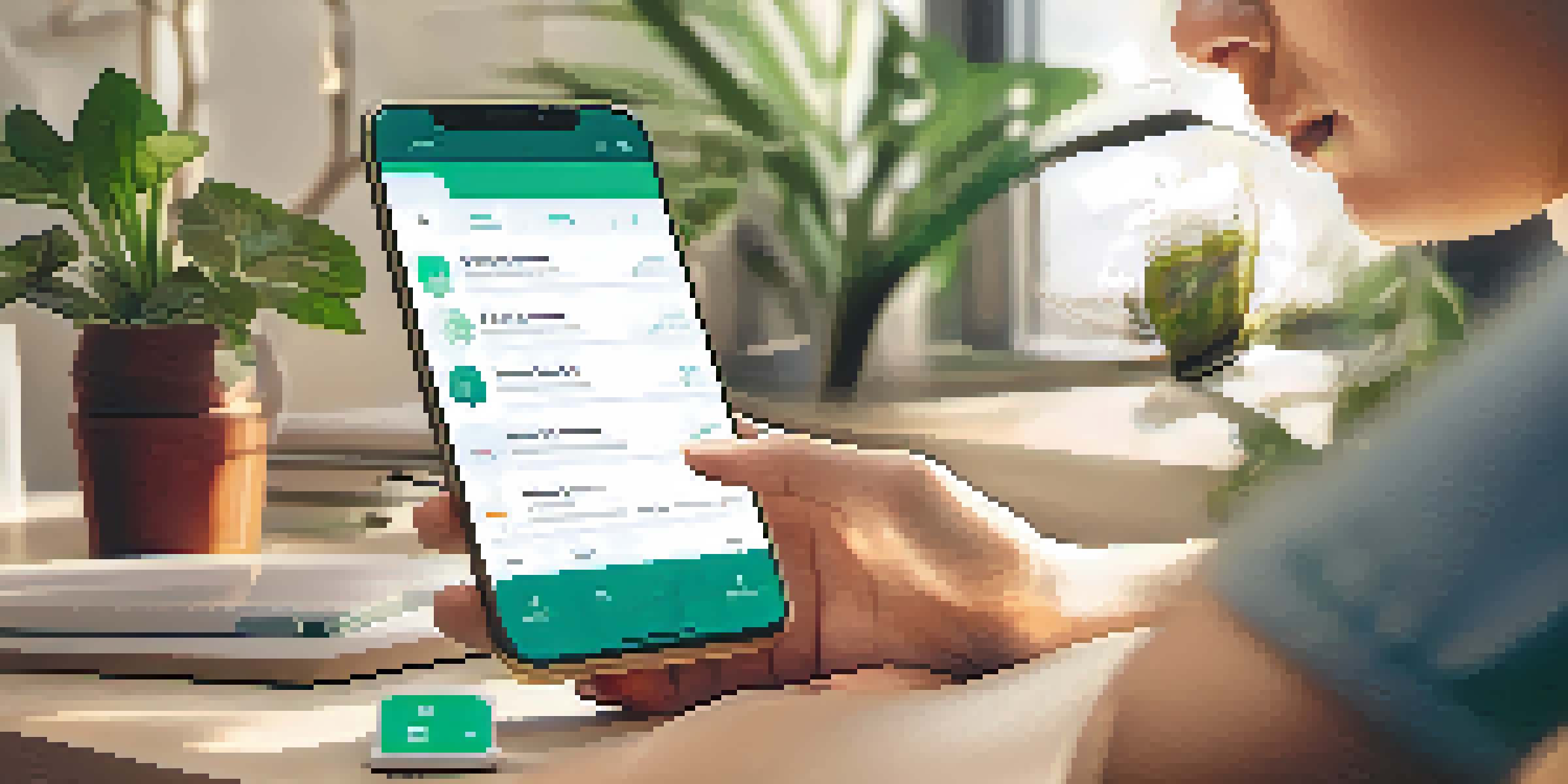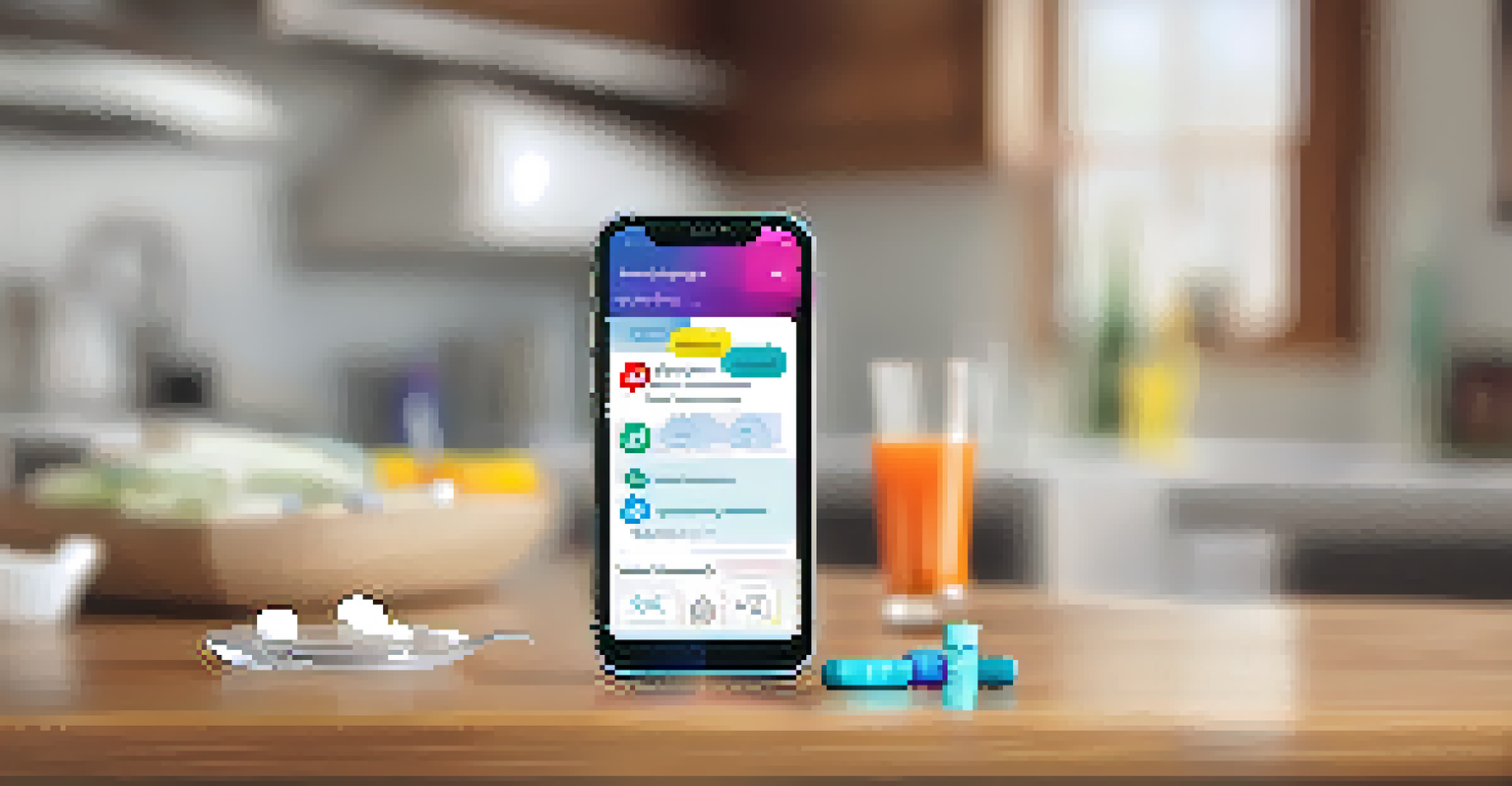Mobile Health Apps: Empowering Patients Through Technology

Understanding Mobile Health Apps and Their Impact
Mobile health apps, commonly known as mHealth apps, are designed to support health-related activities. They allow patients to monitor their health, manage chronic conditions, and communicate with healthcare providers directly from their smartphones. By leveraging technology, these apps empower individuals to take charge of their health, promoting a proactive approach to wellness.
The greatest wealth is health.
For instance, apps like MyFitnessPal help users track their diet and exercise, while others like Diabetes:M assist diabetics in managing their blood sugar levels. This accessibility means patients can easily access vital information and tools, making health management less daunting. As a result, mobile health apps are not just tools; they are companions on the journey toward better health.
Moreover, the integration of mobile health apps into daily life helps to bridge the gap between patients and healthcare professionals. Patients can share data with their doctors in real-time, leading to more informed decisions and timely interventions. This synergy enhances the overall healthcare experience, fostering a collaborative environment that benefits everyone involved.
Enhanced Patient Engagement Through Technology
One of the most significant benefits of mobile health apps is their ability to engage patients in their own care. Traditional healthcare models often leave patients feeling passive and uninvolved, but mHealth apps change that narrative. By offering features like reminders for medication or notifications for upcoming appointments, these apps keep patients actively engaged.

Take, for example, the use of reminders in medication management apps. Patients are less likely to miss doses when they receive timely alerts on their phones. This heightened awareness not only improves adherence but also fosters a sense of responsibility for one’s health, encouraging users to take an active role in their wellness journey.
Empowering Patients with mHealth Apps
Mobile health apps enable patients to actively manage their health and communicate with healthcare providers.
Furthermore, many apps provide educational resources and support communities that empower patients to learn more about their conditions. This access to information creates informed consumers who can ask better questions and make more educated decisions regarding their healthcare. Ultimately, this level of engagement can lead to improved health outcomes and higher patient satisfaction.
Personalized Health Tracking and Monitoring
Mobile health apps allow for personalized health tracking, making it easier for users to monitor their progress over time. For instance, fitness apps can track steps, heart rate, and calories burned, providing users with insights into their physical activity levels. This data-driven approach enables individuals to set realistic goals and celebrate their achievements along the way.
Technology and healthcare are merging to empower patients in ways we could only dream of a decade ago.
Additionally, apps tailored for chronic conditions often include features for logging symptoms and medication usage. This personalized tracking can highlight patterns and triggers, leading to more effective management strategies. For example, someone with asthma can identify what environmental factors contribute to their symptoms, allowing for better prevention.
By providing a tailored experience, these apps help users understand how lifestyle choices impact their health. The more informed patients are about their bodies, the better equipped they are to make changes that promote overall well-being. Personalized health tracking is not just about numbers; it’s about creating a narrative of one’s health journey.
Access to Health Information Anytime, Anywhere
One of the standout features of mobile health apps is the ability to access health information at any time and from anywhere. This capability is particularly beneficial for those managing chronic illnesses or seeking immediate guidance. With everything from lab results to educational resources at their fingertips, patients can make more informed choices about their health.
For example, during a flare-up of symptoms, a patient can quickly check their app for advice or contact their healthcare provider without needing to wait for an appointment. This immediate access can alleviate anxiety and provide reassurance that help is just a tap away. It transforms the patient experience by prioritizing convenience and timely information.
Convenience of Telehealth Services
The rise of telehealth through mobile apps is transforming patient access to healthcare, making consultations more accessible.
Moreover, many apps integrate with health databases, allowing users to stay updated on the latest medical research and treatment options. The ability to have current information enhances patient confidence and ensures that they feel empowered in discussions with their healthcare providers. Ultimately, this level of access is invaluable in today’s fast-paced world.
Facilitating Telehealth and Virtual Consultations
Mobile health apps have revolutionized the way patients engage with healthcare providers through telehealth services. Virtual consultations, once a novelty, are now a common practice, thanks to the convenience of apps. Patients can connect with their doctors without the hassle of travel, saving time and reducing stress associated with in-person visits.
Imagine a busy parent who can schedule a quick video consultation during their lunch break. This flexibility not only benefits patients but also allows healthcare providers to reach a broader audience, including those in rural or underserved areas. Telehealth breaks down geographical barriers, ensuring that quality care is accessible to everyone.
Additionally, the integration of telehealth features in mobile apps often includes secure messaging, allowing patients to ask questions or share concerns outside of office hours. This ongoing communication fosters a stronger patient-provider relationship and encourages patients to seek help when needed, leading to better health outcomes. Telehealth is not just a trend; it’s a fundamental shift in how we approach healthcare.
Data Security and Privacy Concerns in mHealth
As with any technology that handles sensitive information, data security and privacy are critical concerns for mobile health apps. Patients need assurance that their personal health data is protected from breaches and unauthorized access. Developers must prioritize robust security measures to build trust with users and comply with regulations like HIPAA in the U.S.
For instance, encryption techniques can safeguard data during transmission, while secure login methods protect user accounts. Patients should also be educated about the importance of choosing reputable apps that prioritize security. This awareness can help individuals make informed decisions about which apps to trust with their health information.
Importance of Data Security
Ensuring robust data security is crucial for building trust in mobile health apps and protecting patient information.
Ultimately, addressing data security concerns is essential for the continued growth and acceptance of mobile health apps. When patients feel confident that their information is safe, they are more likely to embrace these technologies. Building trust is a collaborative effort between developers, healthcare providers, and users alike.
The Future of Mobile Health Apps and Patient Empowerment
Looking ahead, the future of mobile health apps is promising, with advancements in technology poised to enhance patient empowerment further. Innovations like artificial intelligence (AI) and machine learning are already starting to play a role in personalizing health experiences. These technologies can analyze user data to provide tailored recommendations, making health management even more effective.
Additionally, the rise of wearable technology is set to complement mobile health apps, providing real-time data on vital signs and activity levels. Imagine a scenario where your smartwatch communicates with your health app to alert your doctor if it detects an irregular heartbeat. This seamless integration could be a game-changer in early detection and prevention.

As mobile health apps continue to evolve, they will likely become even more integral to patient care. The focus will remain on empowering individuals to take control of their health while fostering collaboration with healthcare providers. Together, technology and patient engagement can lead to a healthier future for everyone.